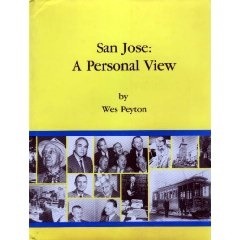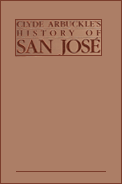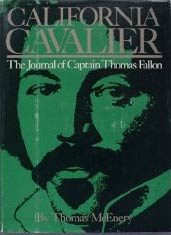Books & Plays
A collection of published works on city government, San Jose and Irish history.

A New Ireland: Politics, Peace, and Reconciliation
Edited and Introduced by Tom McEnery
Foreword by Senator Edward M. Kennedy
Throughout more than twenty-five years of conflict in Northern Ireland, John Hume has been a constant beacon of reason and non-violence. A New Ireland is Hume’s remarkable story of his continuing personal struggle for civil rights, peace and prosperity for all the people of Ireland.

The New City-State
Change and Renewal in America’s Cities
Reviews and Recommendations
In this upbeat appraisal of modern city management by the former mayor of San Jose, Tom McEnery not only illuminates the role of the city-state in our culture, but also brings his experience to bear in offering a prescription to the many ills that currently beset our cities. Using San Jose as his prime example – a city larger than Boston, Atlanta, Washington, Seattle, or Miami, yet having the lowest crime rate of America’s top 50 cities – the author challenges the negativity in the press and elsewhere that condemns our cities to hopeless despair. Replete with sidebars, anecdotes, and profiles of such big-city mayors as David Dinkins, Tom Bradley, Richard Daley, and Marion Barry, this lively but serious book calls on everyone from Don Corleone to Rodney King in dispensing advice on how to improve our cities. The end result, however, is a thoughtful consideration of our present urban conundra, and a hopeful look at the future of the city-state.

San Jose: A Personal View
Collection of San Jose Mercury News columns written between 1979 and 1983, including a fascinating vignette of John P. McEnery.

History of San Jose
Introduction by Tom McEnery.
Clyde Arbuckle’s history of San Jose: chronicling San Jose’s founding as California’s earliest pueblo in 1777, through exciting and tumultuous history which paved the way for today’s metropolitan San Jose : the culmination of a lifetime of research

California Cavalier: The Journal of Captain Thomas Fallon
McEnery describes the journal as “an amazing blend of history, travelogue and soliloquy, with a smattering of philosophy, in this highly fictionalized version of California history.
Fallon and his wife Carmel Castro Fallon helped shape the history of Northern California.

Michael Collins and the Quest for Irish Freedom
Michael Collins and The Future
Remarks by the Honorable Mayor of San Jose, Tom McEnery at Kilmainham Jail/Museum, October 15, 1990, On the occasion of Centenary of Michael Collins’ birth and Tim Pat Coogan’s new biography.
In San Jose many years ago, long before it was the eleventh largest City in the United States, before its well-known metamorphosis into Silicon Valley, the fabled land of innovation and entrepreneurship, that fertile valley was a much different place. We stuffed peaches and pears into crates instead of placing Apple computers on children’s desks. The wines of Paul Masson, Mirassou and Novitate were the staples. The pace was low, the mood relaxed. People relished in our nickname, “Valley of Heart’s Delight” or “Blossom valley.” No one had heard of transistors, or VCR’s or Walkmen, space probes or Polaris missiles; they were unconcerned with how much information could be squeezed onto a microchip. In the century that preceded those years of change, San Jose was a different world from the amazing place it has become. It was the home of farmers and vintners. It was also a land of immigrants, and in one of those many suburbs of San Jose where so many immigrants have been drawn, my father brought me to the funeral of one such man. I served as the altar boy; I knew the deceased as a kindly, wizened old man who often visited my father’s home. During the eulogy, delivered by my uncle, Father Henry MacEnery, I remember the phrase “ . . . he loved Ireland,” His name was Michael McDonnell, for years he was a quiet attendee at numerous Irish events and at a few family functions; he was also a West Cork man, and the founder of Michael Collins’ “Squad,” his “Twelve Apostles” – steely men who performed their work in a grimly, efficient manner. The results were written plainly on the face of a man, old before his years. I would not think of this “apostle” again for a long time.
Fifteen years later, researching for my Master’s Thesis in County Kerry, I again encountered the “Squad,” in the family rendition of an IRA Captain, my Uncle Jim’s, execution in May, 1923, by a McDonnell associate. The commander of the Free State forces in Tralee was Paddy Daly-an alumnus of the same group, its second commander. I became more and more interested in my travels thru Irish nationalism, with the leader that these young, determined patriots, worked for and idolized. I have walked many times the Dublin streets he frequented, and, sometimes in the company of Tim Pat Coogan, visited his haunts around Parnell Square. What type of man could command the respect and allegiance of such soldiers? Ask ‘so’ much of them?
Michael Collins is one of those men who seems to grow larger and larger from a distance. In a splendid and long awaited new book, the story is told as never before. His figure is shrouded with mystery and confusion. That is certainly part of his appeal. Now, we get to peek behind the curtain. At the youngest of ages he held sway upon the world stage for a flickering few moments and then, just a quickly, faded back into the mists of misunderstanding, ideology, antagonism – and history.
History can often be used for so many different and often times damaging purposes. It can be as Joyce said, “a nightmare we are trying to awaken from.” Yet it can also be crisp and clear; informative and clarifying. It can remove the clouds and the mud of lies. I always found Collins a typical product of his environment. Centuries of oppression and resentment are visible in him. But there was a softer side – a side that could as Frank O’Connor notes, “laugh and weep,” in rapid succession: the side of the poet and the visionary.
“I was much fonder of old people in the darkness than I was of young people in the daytime,” he once said. Around the fire at night or the smithy forge, he heard of the “Plan of Campaign” and the dreaded “boycott.” Clonakilty was an active place in those times. All the old glories, all the old inequities came alive. Broken treaties, martyred priests, we all know the story well. Padric Pearse once said that Irish patriotism was like a divine religion, transferred from generation to generation like an apostolic succession. This was the genesis of a revolutionary; this was Michael Collins – inoculated from youth against apathy, burning with a love of Ireland.
Very often the most idealistic have difficulty with the role of realist. The romantic strain in Collins was decisively tempered. He led a revolution but as an observer said “he only destroyed to rebuild. His mind was essentially constructive.” He seemed to be intent on building a new Ireland, distinguished by social justice, economic strength and political freedom. His thoughts on primary education are quite general, but interesting, and although his industrialization policies were embryonic and sketchy, still they are worthy of note.
He coveted the leisure time to build a country with a strong economy. Having emigrated to find work himself, he was cognizant of the hemorrhaging of Irish talent to the four corners of the world-weakening Ireland as each new exile “spread the grey wing on every tide” in the poet’s words. Well would Michael Collins have recognized the strong policies to reverse that tide, recruit the Apples, Amdahl’s, and Raychem’s. One year ago, I participated in the seminal announcement of the Intel plant in Leixlip-the latest of many economic alliances between Ireland and San Jose/Silicon Valley. Ironically the site is quite near Lucan, the home of the titular leader of the “Wild Geese,” Patrick Sarsfield. The need today to keep Ireland’s talent at home, the bright faces of those graduates that I see walking up Grafton Street, would have been apparent to Michael Collins. Collins was s a very young man when thrust by his own talent, enterprise and fate onto the great stage; he had much to learn and far to develop. Prosperity, he knew was the key to the evolution of Ireland, without dependence on England or the continued bleeding thru emigration. “A prosperous Ireland will mean a united Ireland,” he said. He would have quite readily recognized the road, to Leixlip, transcending Lucan, the Wild Geese, and all of their connotations.
When a nation loses a person of Collins’ stature, at such a young age, it is normal for exaggerated opinions of his future to be formed. Idolatry can begin. Sometimes it is even warranted. In America, Lincoln’s end could be mentioned or certainly the assassination of John Kennedy, which led to such a series of snap, semi-authoritive assessments- Kennedy would have ended the American involvement in Vietnam it is said, or fully completed the historic Civil Rights legislation. In his case, the truth is tempered with hagiography. Even the continued theories about Kennedy’s death, ironically from a massive wound in the back of the head, like Collins, connect the two leaders together, Neither would ever “live to comb grey hair.” William Shannon comments about fallen heroes how they died “in youth, in promise and violence,” The cult of the “lost leader” is necessary emotionally, to those who are left behind. It is almost an understandable continuation of the wake.
In the case of Collins- it is certainly true. I would suggest that far more than any other leader in Irish history, the death of Michael Collins was staggering to the nation. He grasped when he wrote: “Believe me, the Treaty was the one opportunity we may ever get in our history for going forward to our idea of a free independent Ireland, and “What is a stepping stone?” Collins knew – he saw a boulder! This was no mere rhetoric. He had the moral courage to sign a document that he knew could lead to his own repudiation and death – because it was the right thing to do; he felt a responsibility to the people. He may have been confused and erratic in his final months, but the decisive man of action, the man who had broken the back of the vaunted British intelligence network, ordered the assault on the Four Courts and the death of Field Marshal Wilson, that man would have been decisive as well in the many actions of nation-building. When he took the road that led to the Mouth of the Flowers, many hopes and dreams traveled with him. They did not survive the journey through that vale of Beal na Blath.
Again, Professor Joseph Lee in his fine work offers that Collins “possessed pre-eminent abilities to distinguish him from the survivors.” His death, among so many private tragedies, was indeed a national one. Tim Pat Coogan notes the “cost in idealism, energy and enthusiasm” . . . and the resultant “bitterness, cynicism, disillusionment, and emigration” always emigration. The exodus of the best and the brightest- the curse of Ireland. Collins would not accept his lot as simply the “best postal clerk” in a flawed colonial system – he dreamed of more. His death was unbridgeable! In his own words, quoted by Coogan, but with a slightly different meaning-listen: “We are losing many splendid men-many fine noble friends. I hope someone will be left to pay due tribute to their deeds and memories-but only one tribute can repay them-the freedom of this land and in God’s good time that will rest with us.” And so it always does-with the survivors.
To contradict, Yeats for a moment: ‘We know their dream,” but it is not enough to know they dreamed and are dead! We must remember and learn. Dreams are very powerful things-Irish history proves nothing if not that salient fact. While more tangible items can be squandered, more substantive agendas dismissed-a dream is always with you, as close as you wish it to be-right before your eyes-omnipresent, beckoning.
When we think of Michael Collins , we should think of him as a dreamer. One who knew the difficulties and exigencies of a hard world, but who would not accept mediocrity, a leader looking forward to the resurgence of an Ireland where no exiles would originate. This would be a place where economic development would continue; a land where schools would prosper, and children would have computers on their desks, not rifles on their shoulders.
Although the border dividing this land has been source of so much tragedy and pain, I believe that Collins would have recognized the need to minimize the border that exists in people’s minds and hearts as well as any physical frontier. The ceremony at Woodfield yesterday would have heartened him. He would have welcomed the British Ambassador there and here tonight.
There is a popular ballad by Mary Black that speaks of such a world:
“That somehow this black night Feels warmer for the spark To hold until the day When fear will lose its grip and heaven has its way.”
In a world so startled by peace, perhaps the new light of freedom from Eastern Europe and Central America can guide us towards that day. No matter how dark the moment, Collins looked toward the dawn. That, I believe, is the way to remember him as we celebrate a tremendous new biography and the Centenary of his birth.
Michael Collins was a man who loved his land, and gave his total effort-even his life-to improve it. Maybe soon it will be appropriate to write Collins’ epitaph along side Emmet’s, when the youthful genius of UCD, Dublin City U, and Trinity, fulfill at long last Collins’ dreams and their own, and forego emigration, to stay at home, home where a young man like Michael McDonnell will not be forced onto a path of violence, disillusion, and exile in a strange land called California. Together we must plan and work and dream, always dream, of that better future that Michael Collins longed for, in a free and a prosperous Ireland.****
Masters Thesis at Santa Clara University written by Tom McEnery, on the founder of the Irish State and leader of the guerrilla battle against the British Empire and the controversial negotiated peace. Collins’ life was written out of Irish history by his rivals and his early, tragic, death remains shrouded in an untold history until the epic biography by Tim Pat Coogan of which was the maiden event; followed 5 years later by the movie by Neil Jordan. Collins is now perhaps the most popular person in Irish history.
